Global Issues

I have so often pondered what might have happened if the media had covered more honestly the stifling of protest that Nakba Day in 1999 and as a result the local officials and the world community had heard the cry? Could the disaster have passed and peace with justice been advanced.
Today the media is much more candid. One wonders if we have received a rare gift of unaltered reality in this period of deepening crisis in the Holy Land and overheated atmosphere in the American presidential campaign. For this week it is being reported clearly that we have a presidential candidate, and probably millions of likeminded uninformed voters, who are apparently oblivious or uncaring about the explosive oppression of Palestinians.
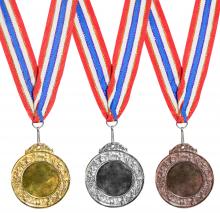
Of course, there’s a part of all of us that loves a winner. There’s a reason why so many people wear the jerseys of their favorite teams or players (way more when that person or team is on top than not, by the way), why we revert to a sort of tribal level of passion — painting our faces, screaming rabidly — and why we practically make a religion out of our sports. At one level, it’s inspiring to see someone achieve what appears to be unattainable. The idea of doing what most Olympians do — or all professional athletes, for that matter — is hard to comprehend. But when we get to witness it, it serves to embolden our faith in humanity a little bit.
Yes, we screw up a lot, we fight each other, and we’re warming up the planet at an alarming rate. But once in a while, it’s transcendent to watch someone do something amazing, beautiful, a little bit closer to perfect.
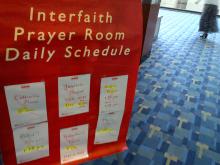
It’s a rare place of worship where Muslims and Baha’is both congregate, and where prayer rugs share space with a silver cross, religious pamphlets on healing in Hebrew, and a bright scarlet AIDS bow. But on Wednesday afternoon, that was the scene at the Interfaith Prayer Room of the AIDS 2012 conference.
“This room is designed for Muslims, Christians, Hindus, Jews, Baha’is — for anyone who needs to find a place for quiet and prayer, and counseling, if necessary,” said Imam Dr. Abdul-Malik Ali, who just finished leading prayers beside a broad banner reading “Faith in Action — End Stigma Now.”
A sign in English, French, Spanish, and Arabic welcomed worshippers to the carpeted prayer room. Double doors cut the clamor of thousands of convention-goers to a murmur, so that inside, even the faintest clicking of the ventilation system was audible. To complete the contrast with the outside’s roar and bustle, the air was cool and the lights were gently dimmed.
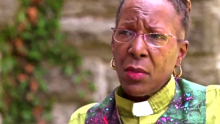
The Rev. Andrena Ingram is currently the only known Lutheran ordained pastor living openly with HIV. Her husband's death from an AIDS-related illness, and the shame that he felt, inspired the pastor to be open about her own diagnosis with HIV. She is known as "The HIV Minister" – a title that has helped others with HIV reach out to her for help.
Listen to Ingram tell her story inside the blog...

In the 31 years since the discovery of HIV and AIDS, nearly 30 million people have died from the virus with 34 million people currently living with the disease.
The epidemic is at its worst in sub-Saharan Africa, and women are affected the most. In fact, 59 percent of people living with HIV and AIDS in sub-Saharan Africa are women.
Statistics like these are mind-numbing. Though necessary, they can nearly cripple our response as they point to the inefficacy of our actions.
This is why, when I teach or write on HIV and AIDS, I prefer to tell stories. And as people of faith, we need stories, both ancient and new, to help us navigate our response to social issues such as HIV and AIDS.
The ONE campaign’s mission to fight AIDS has grown wildly since its inception in 2004, and recently, the organization began a new initiative striving to "begin the end of AIDS" by 2015. It’s within our reach, they say, if only we would lend a hand.
In their latest promotional message, they enlist help from the folks at Funny or Die, along with bigger names like Zach Galifianakis, Sarah Silverman, and Tracy Morgan. In a video that seems like a sketch straight out of the "internet absurdity" vault, the celebrities take turns musing on the innovations that might be possible in a future age, the year 2015. After dreaming of hybrid animals roaming the planet, cars that fit into your back pocket, they close by mentioning that in the not-so-distant future, AIDS can be on its way to nonexistence, if only people would wake up.
See the video at ONE (but be forewarned, it includes some slightly unseemly language).
And CLICK HERE for more details on ONE's 2015 campagin.
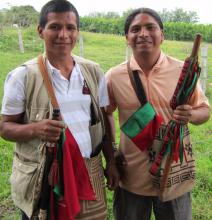
Activists from Colombia’s indigenous Nasa people continue to make headlines — but there’s far more to their peacemaking than the occasional story that makes the U.S. news. Here’s part II of the interview I did with two Nasa Indigenous Guard members, Manuel and Herman, in Cauca, Colombia, last August. The interview took place a month after an earlier round of violence: a bus bomb, suspected to be from the FARC, that went off in the town of Toribío, killing three and wounding more than a hundred in July 2012.
Sojourners: What’s it like to be in the Indigenous Guard?
German: Being an Indigenous Guard is very risky. Obviously there are moments of conflict in which you know what you’re facing -- then there are moments of apparent calm, but calm can switch into situations of risk very quickly.

The photos from rural Cauca, Colombia are so dramatic they’ve repeatedly made the international news: indigenous Colombian activists--bearing sticks, community spirit, and a whole lot of moxie--demanding that heavily-armed FARC guerrillas and government armed forces alike leave their territory. As the war between the FARC and the government heats up again in Cauca, civilians are — as usual — getting caught in the crossfire; the town of Toribío has been attacked 14 times this year, according to the BBC.
In response, Nasa activists last week shouted FARC guerrillas from their roadblocks back into the jungle, overran a hilltop government military outpost, and booed Colombian President Manuel Santos when he went to Toribío to hold a saber-rattling emergency cabinet meeting. (Yesterday, government forces used tear gas to drive out activists and re-occupy the post).
Last summer, in Cauca with Witness for Peace, I was able to interview two of those activists, members of the Indigenous Guard formed by the Nasa ethnic group. The Indigenous Guard , armed only with beribboned ceremonial staffs of office, has been standing up against armed groups for years--for example, marching into the jungle to successfully demand the release of Toribío’s mayor when the FARC abducted him in 2004. What empowers these activists? Here’s what I learned last year from two Indigenous Guard members, Manuel and German (as translated by Witness for Peace Associate Director Jess Hunter-Bowman)

This year, more than 3,000 Muslim athletes will compete in the Olympics, but many will not fast, a decision that has been sanctioned by religious authorities. While Muslims are increasingly common on Western teams -- for example British rower Mohamed Sbihi and French boxer Rachid Azzedine -- no Muslims made the U.S. team this year.
Nyambui said the hard part about track is training. Competing is easy. Had Ramadan occurred before the Olympics, when athletes prepare their bodies for competition, then his performance would have suffered, he said. He acknowledged that fasting can present difficulties for athletes, but usually only during the first or second weeks of Ramadan when the body is still adjusting to the rigors of fasting.
“After that people are used to it,” said Nyambui, speaking from his office in Dar es Salaam, Tanzania's largest city. “People play soccer, they can go jogging, they can go swimming.”
The atheist community has embraced the cause of an Indonesian man, Alexander Aan, who was beaten and jailed after denying God’s existence on Facebook and posting cartoons of the Prophet Muhammad.
The Center for Inquiry, a Washington-based humanist organization, launched a petition Tuesday (July 17) on behalf of Alexander Aan, a 30-year-old Indonesian civil servant currently serving a 30-month jail sentence for “deliberately spreading information inciting religious hatred and animosity,” according to the judge who sentenced him.
The petition asks the Obama administration to pressure the Indonesian government for Aan’s release and for better protection of religious freedom in that country, the most populous Muslim nation in the world.

The Higgs boson is perhaps better known by its sexier nickname: the "God particle."
But in fact, many scientists, including the physicist for whom it is named, dislike the term.
In 1993 when American physicist Leon Lederman was writing a book on the Higgs boson, he dubbed it "the goddamn particle." An editor suggested "the God particle" instead.
One thing is clear: The July 4 discovery that marked a new chapter in scientific knowledge also reignited debate over the universe’s origins — and the validity of religious faith as scientific knowledge expands.
The Higgs boson explains why particles have mass — and in turn why we exist. Without the boson, the universe would have no physical matter, only energy.
The cosmological implications are hotly debated. Can God fit in a scientific story of creation?
EDITOR'S NOTE: Melinda Gates talks to the Guardian (UK) newspaper about reconciling her Catholic faith — the wife of Microsoft chairman Bill Gates says she attends mass regularly — with her work promoting family planning. Gates was in London this week to discuss promoting contraception in the developing world with UK government representatives. The Gates Foundation hopes to encourage donor pledges that will enable 120 million women to have access to contraceptives by 2020.

Physicists answer the question "What is the Higgs-Boson?"
In 1964, the British physicist Peter Higgs wrote a landmark paper hypothesizing why elementary particles have mass. He predicted the existence of a three-dimensional "field" that permeates space and drags on everything that trudges through it. Some particles have more trouble traversing the field than others, and this corresponds to them being heavier. If the field — later dubbed the Higgs field — really exists, then Higgs said it must have a particle associated with it: the Higgs boson.
Fast forward 48 years: On Wednesday (July 4), physicists at the Large Hadron Collider (LHC), the world's largest atom smasher in Geneva, Switzerland, announced they had discovered a Higgs-like particle at long last. If the new particle turns out to be the Higgs, it will confirm nearly five decades of particle physics theory, which incorporated the Higgs boson into the family of known particles and equations that describe them known as the Standard Model. (Source: LiveScience.com)
Still confused? (We are.) Inside the blog, four physicists explain on video.
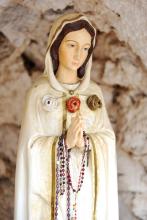
STERRETT, Ala. — Marija Lunetti, one of six young peasants who claimed that the Virgin Mary began appearing to them in 1981 in Medjugorje, Yugoslavia, says the mother of Jesus is aware of the economic crisis in Europe.
"She's more preoccupied with spiritual (matters)," Lunetti said. "When there is a spiritual crisis, there is also an economic crisis."
Lunetti spoke briefly in an interview about the economic crisis in Europe and the weather - "Hot like here," she said - before she had her daily apparition on Sunday (July 1) night on her visit to Shelby County, Ala. During the apparitions, she says the Virgin Mary appears to her and prays over the pilgrims, even though they cannot see her vision.
Siham Abu Awwad grew up in a Palestinian family in a small West Bank village. When Siham was 14, her mother was imprisoned for six months for demonstrating against the military occupation of the West Bank. Siham became the woman of the house, caring for her four brothers—Khaled, Youssef, Ali, and Maha.
With their mother in jail, Siham and her brothers became very close. “We had a special place in each other’s heart,” she told me. Missing her mother, and with little time for friends, Siham became especially close to Youssef. “I told him everything. He was kind and sensitive. He was like a sister!”
When Siham’s mother returned from prison, she continued her political activism and was soon arrested again, but she maintained a sense of humor and challenged her children to be kind and good.
The establishment of a nearby Jewish settlement led to ongoing seizures of land from Siham’s village, and there were frequent protests. By the time Siham was 17, her mother and all her brothers had been in and out of jail for participating in the protests that are illegal under Israeli law. Knowing she would likely be imprisoned again and concerned for her daughter’s future, Siham’s mother encouraged her to marry. Siham did, and eventually gave birth to five children.
Youssef and Ali both married too, but happiness was short-lived. Two months after his wedding, Ali was shot in the leg by a settler. Doctors wanted to amputate his leg and feared he would not survive, but his mother arranged treatment in Saudi Arabia, where Ali’s life and his leg were saved. While preparing a celebration for Ali’s return, Youssef was shot and killed by an Israeli soldier at a checkpoint. “Youssef was our angel,” said Siham, “always with a smile.”
IN APRIL, THE World Bank’s executive directors selected Dr. Jim Yong Kim to serve as its president. Kim, whose five-year term begins in July, will be the first World Bank president whose primary experience is in community-level development. Most of his predecessors were bankers or politicians.
As a co-founder of Partners in Health, an international nonprofit dedicated to “a preferential option for the poor in health care,” and as a former director of the HIV/AIDS department of the World Health Organization, Kim has done groundbreaking work in delivering essential medicines for the treatment of AIDS to impoverished countries. He has a proven capacity for designing effective solutions to real problems. His election may well usher in a new culture at the World Bank—a culture that focuses not on economic growth that doesn’t trickle down, but on poverty reduction that is real.
For almost 70 years, the World Bank and the International Monetary Fund (IMF) have been major players in the global economy; the World Bank has 188 member countries, all of which must first be admitted to the IMF. In their many years of doing business, these institutions have reinvented themselves more than once. The World Bank’s focus has evolved from rebuilding Europe and Japan following World War II to supporting large-scale engineering projects in so-called “developing” countries; from emphasizing nutrition, population, and poverty in the 1970s to “adjusting” the economic policies of countries in the global South, beginning in the early 1980s.
As the negative impact of IMF policies and World Bank projects on impoverished people and their communities became increasingly evident, people of faith and grassroots groups around the world, particularly in the global South, began demanding change. They organized and advocated for greater transparency, accountability, and participation, insisting that failed strategies promoted and financed by the IMF and World Bank were related to hunger and other poverty-related problems, a growing rich-poor gap in almost every country, and environmental destruction.
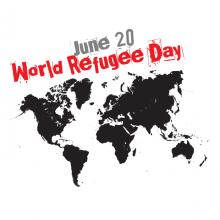
Who is a refugee in our world today? How does one receive “refugee protection” and is this determination fair and just? On World Refugee Day 2012, June 20, we remember those who have fled persecution because of their ethnicity or country of origin, religion or political views.
These atrocities are serious and asylum an appropriate response. The UNHCR reports that 800,000 people became refugees in 2011, while a total of 4.3 million people became newly displaced (mostly hosted in Africa and the Middle East).
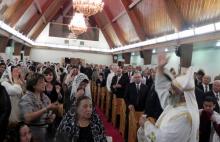
The fate of Copts looks as tenuous as ever as Egyptians struggle to determine who won this weekend's first-ever democratic presidential elections. Presented with what many saw as a lose-lose proposition, Egyptians had a choice between Ahmed Shafiq, former prime minister of ousted leader Hosni Mubarak, or Mohammed Morsi of the Muslim Brotherhood, who many fear will turn the country into an Islamic state.
Though final results are not yet in, the Muslim Brotherhood has projected its candidate as the winner. Within hours, Egypt’s military caretaker government, which is seen as sympathetic to Mubarak's old regime, issued an interim constitution that granted itself broad power.
Carl Moeller, who leads the Southern California-based Open Doors USA, an organization that works with persecuted Christians worldwide, estimates that approximately 100,000 Coptic Christians abandoned the country for the U.S. or Europe last year following the turbulence of the Arab Spring and attacks on Coptic churches.

T.J. Foltz has a recipe to help the world's poor: Take one part entrepreneurship, one part social media savvy and one part faith-based motivation. Fold in the world's largest retailer.
Then add water.
If every American spent $10 per year on his Humankind Water — less than they spend on Halloween candy — it would be enough to nearly eradicate the world's water sanitation problems, Foltz says.
Foltz, a former Christian youth minister, put out his first bottle of Humankind Water last October. The idea is to sell bottled water in a socially conscious way, with 100 percent of net profits going to fund clean-water projects in Haiti, Asia and Africa.